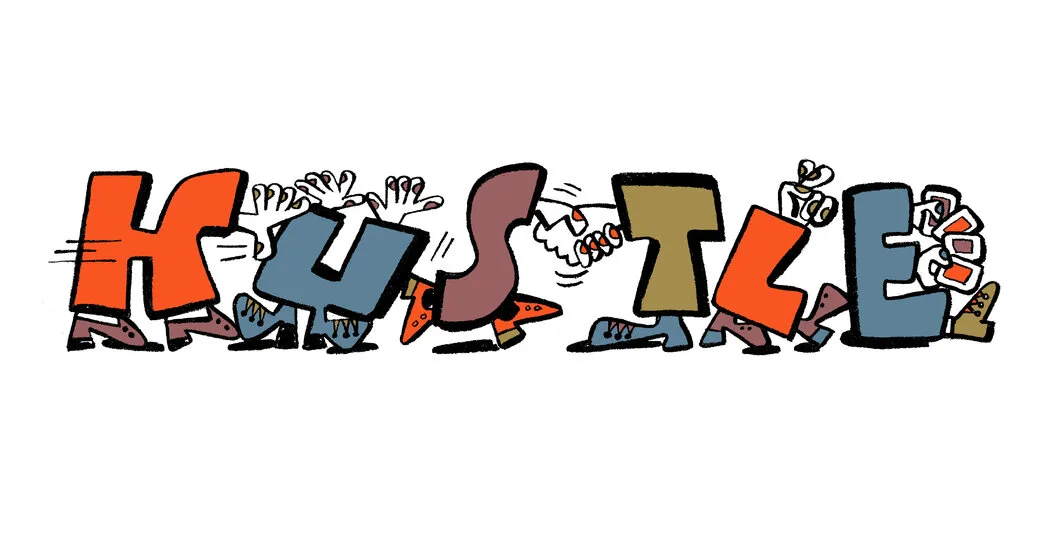
The word “hustle” was first recorded in the 17th century. In the 20th, it took on an economic context in African American communities.
In Word Through The Times, we trace how one word or phrase has changed throughout the history of the newspaper.
In 1892, The New York Times printed an account from a reporter in St. Petersburg, Russia. The reporter said Grand Duke Sergei Alexandrovich, posing as a “peasant,” got into a “squabble with a baker.” Not knowing who he was, police officers “hustled” the duke. They were about to arrest him when he revealed his identity.
The verb hustle came from the Dutch “husselen,” meaning “to shake or toss,” and was first recorded in the 17th century, according to the Oxford English Dictionary. By the 18th century, it could also mean “to push or knock a person about roughly” (what happened to the duke, most likely) or to move hastily.
By 1800, to hustle meant to rob someone while pretending to bump into the person, according to Grant Barrett, the head of lexicography for Dictionary.com. And a “hustler,” William Safire wrote in The Times in 1975, was someone “who shook up, or jostled, a victim while an aide picked his pocket.”
By the turn of the 20th century, the meaning “aggressively pursue an activity that will benefit you” was firmly established, Mr. Barrett said. Sometimes, a hustle was a moneymaking scheme or prostitution: For example, a Times article from 1997 described dealing drugs as one of the hundreds of “hustles” in New York; an article from 1975 stated, rather heedlessly, that women in an Alaskan oil town were “hustling pipeline workers.”
But “hustling” wasn’t always illegal; one who hustled could also be working exceptionally hard to make an honest living. That idea took on meaning in Black communities.
“Hustle” was used in African American newspapers and other works in the 20th century, reported Isabella Rosario in a 2020 column on hustling’s roots in Black culture for NPR’s Code Switch. She wrote that the word was used “to describe the reality of what many poor black people had to do to make ends meet.”
A 1964 Times article by the scholar C. Eric Lincoln explored economic stratification and its roots in slavery: “The head of the family works at two jobs, and occasionally at three. Such supplementary work … is known as ‘a hustle,’” he wrote, adding that the term was “quite familiar” to Black, middle-class Americans.
One of the first appearances of the phrase “side hustle,” meaning an additional job, was in 1950 in The Chicago Defender, a Black newspaper, according to the Oxford English Dictionary. “Side hustle” appeared in The Times about 25 years later.
According to Lester K. Spence, a professor of political science and Africana studies at Johns Hopkins University whose book “Knocking the Hustle” explored the effect of neoliberal politics on Black communities, “the hustle” was popularized as the striver’s code, in part, through rap and hip-hop music. By the 1990s, hustling “became positive,” he said in an interview, adding that it was even something you were “supposed to do.”
Indeed, the 2000s hustled in “hustle culture.” The first appearance of the phrase landed in The Times in 2019 in an article by Erin Griffith about people who loved (or pretended to love) toiling away at work: “Hustle culture,” Ms. Griffith wrote, “is obsessed with striving, relentlessly positive, devoid of humor and — once you notice it — impossible to escape.”
In a recent interview, Ms. Griffith noted the shifting attitude toward hustle culture. “It’s still the playbook people follow in hopes of hitting it big,” she said, “but not many people pull that off. What results is burnout.”
Perhaps fittingly, a Well article last year encouraged taking breaks during the workday — “no matter what hustle culture wants you to believe.”

